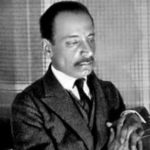Welcome to September’s Poem of the Month, a selection from a new poet (to me) – Rainer Maria Rilke (1875-1926). Born in Prague, he was sent off to military school until an uncle, who recognized his young literary talents, arranged for him to transfer to a German preparatory school. He published his fist volume of poetry in 1894, when he was 19. In 1895 he went to Russia, a trip that would prove to be a milestone in Rilke’s life – he met Tolstoy and began the true beginning of his early serious works. He later moved to Paris, where he met and married Clara Westhoff, who had been a pupil of Rodin. In 1902 he became the friend, and for a time the secretary, of Rodin, and it was during his twelve-year Paris residence that Rilke enjoyed his greatest poetic activity. When World War I broke out, Rilke was obliged to leave France and during the war he lived in Munich. He died of leukemia on December 29, 1926. At the time of his death his work was intensely admired by many leading European artists, but was almost unknown to the general reading public. His reputation has grown steadily since his death, and he has come to be universally regarded as a master of verse.
Warmest regards to you as the first signs of fall flitter in the late August air…
Stewart

Rainer Maria Rilke
(1875 – 1926)
I Am Much Too Alone in This World, Yet Not Alone Enough
I am much too alone in this world, yet not alone enough
to truly consecrate the hour.
I am much too small in this world, yet not small enough
to be to you just object and thing,
dark and smart.
I want my free will and want it accompanying
the path which leads to action;
and want during times that beg questions,
where something is up,
to be among those in the know,
or else be alone.
I want to mirror your image to its fullest perfection,
never be blind or too old
to uphold your weighty wavering reflection.
I want to unfold.
Nowhere I wish to stay crooked, bent;
for there I would be dishonest, untrue.
I want my conscience to be
true before you;
want to describe myself like a picture I observed
for a long time, one close up,
like a new word I learned and embraced,
like the everday jug,
like my mother’s face,
like a ship that carried me along
through the deadliest storm.




